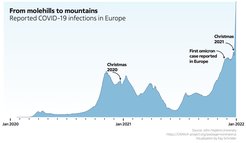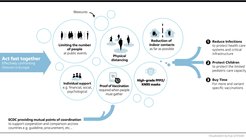Together against Omicron
European countries must act together quickly to confront Omicron, state scientists from all over Europe
A multi-disciplinary team of over 30 scientists from all across Europe have joined forces to issue a statement to address the wave of the Omicron variant of SARS-CoV-2. The statement was published in the renowned British Medical Journal (BMJ) on January 11, 2022.
In their call to coordinated action, they warn that Omicron remains concerning even when headlines are suggesting that Omicron causes a milder form of COVID-19. Hence the experts call for immediate action, namely taking measures to reduce the number of infections, while protecting children and proceeding the vaccination efforts.

Due to immune evasion, several countries are currently experiencing sharp increases in incidence that threaten the already fatigued health care systems in Europe. Claims such as “everyone will catch Omicron eventually” suggest that it no longer matters if protective measures are taken. However, if people are no longer concerned about protection against COVID-19, careless behavior might lead to an even faster spread. It is critical to understand that well-established evidence-based measures are still effective at reducing infections. The international team of scientists, led by André Calero Valdez from RWTH Aachen University, focus on three reasons why immediate action is important.
First, reducing the number of infections will also reduce the number of cases admitted to hospitals. This is critical to protect our already burdened health care staff and systems. Reducing case numbers will also help protect critical infrastructure that is threatened by staff shortages from illness, quarantine and self-isolation. The measures necessary to achieve these goals are well established and backed by scientific evidence.
Second, it is important to protect children, who have not been vaccinated to a large degree. As health care capacities for children are limited and not under the same surveillance as adult healthcare, high community transmission could also lead to an increase in hospitalization of children. “Hospital capacities for children could be reached quickly if incidence peaks too fast. Therefore, it is important to reduce infections and to better monitor paediatric capacities.”, remarks coauthor Emil Iftekhar from the Max Planck Institute for Dynamics and Self-Organization. Nonetheless, it is crucial to keep education and the children’s well-being in mind via continuation of teaching with expanded testing at the safest possible environment (e.g., high ventilation standards and masking). School closures may be deemed necessary but should be considered a last resort measure and be compensated by alternative forms of teaching (e.g., remote learning). Here, the scientists point to the potential of European exchange and cooperation with regards to best practice, facilitated by the European Commission or the European Regional Office of the World Health Organization.
Third, lower incidence is necessary to buy time for more vaccinations. Vaccinations, and third doses in particular, help reduce severe cases substantially. “This protection is still present against the Omicron variant.”, underlines Prof. Paul Wilmes from University of Luxembourg and coauthor of the statement: “Recent vaccination even protects partially against infection.”

As the COVID-19 pandemic has never been solely a local problem, coordination and cooperation in the European Union and the WHO are essential for reducing the impact of the Omicron wave in Europe and the world. This concerns, for example, infodemic management: “Health authorities have to make more effort to maintain the trust of the people and to mitigate the harmful effects of the infodemic.”, urges Dr. Elena Petelos from University of Crete and Maastricht University and also coauthor of the statement. Lastly, cooperation is also crucial for global vaccination efforts. “The current situation highlights the importance of supporting lower- and middle-income countries, for example through initiatives such as ‘Access to COVID-19 Tools (ACT)’ and ‘COVID-19 Vaccine Access Facility (COVAX)’. This will not only help to prevent new variants but should be a matter of course in the spirit of solidarity,” says Dr. André Calero Valdez.
“Albeit milder, Omicron’s immune escape is putting health care systems into high pressure. Reducing this pressure is critical to avoid renewed far-reaching measures such as closures or lockdowns. ”, adds Dr. Miquel Oliu-Barton from University Paris-Dauphine.

